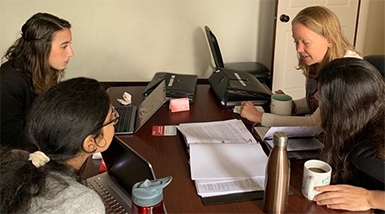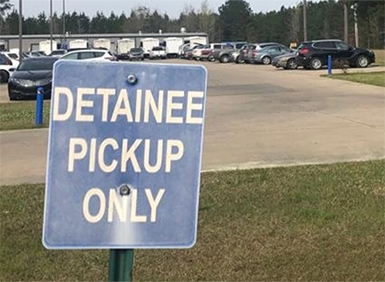Global Justice Clinic brings legal services to detained immigrants during Spring Break
Members of NYU Law’s Legal Empowerment Documentation Project spent their spring break in Louisiana volunteering their time and expertise with the Southern Poverty Law Center’s Southeast Immigrant Freedom Initiative (SIFI).
The team included Ellie Happel ’11, staff attorney with NYU Law’s Global Justice Clinic, Nikta Daijavad ’20, Beenish Riaz ’20, and Alex Cubaleski ’21, who is not a member of the project, but who joined the team as an additional English-Spanish translator.
“Our team—the Global Justice Clinic and the [Robert L. Bernstein Institute for Human Rights]—is documenting how immigrant rights organizations are increasing access to justice and shifting power to affected communities,” says Happel. “SIFI provides pro bono legal assistance to immigrants detained at detention centers in the Southeast, where rates of representation are extremely low. This means many people are detained and deported with never seeing an attorney. SIFI relies on short-term volunteers to work with them to try to bond people out of detention, where they are more likely to successfully fight their case.”
During the week, the students met in pairs—one Spanish speaker per pair—with detained individuals at two US Immigration and Customs Enforcement (ICE) detention centers in Louisiana, LaSalle ICE Processing Center and Pine Prairie ICE Processing Center. They interviewed clients to determine if they were eligible for release on bond—that is, not identified as a threat to the community or a flight risk. Students also did legal research, wrote motions, and observed hearings in immigration court.
Riaz says that in Pine Prairie’s center, the students were able to interact with their clients without barriers, but in LaSalle, they were separated from clients by glass. “Seeing the difference between the centers and knowing the privilege of being able to walk in and walk out, and the other person not having that even though they’ve not done anything wrong was striking,” she says.
The immigrants’ cases ran a gamut of scenarios. Some had crossed into the United States seeking asylum; others had lived in the United States for years, but were arrested for infractions and detained. Cubaleski describes a client who, after consuming a few beers and riding as a passenger in a car, was arrested for public intoxication and imprisoned at the Pine Prairie facility. “He is from Alabama, he’s been transferred to Louisiana, he’s far away from family and resources and incredibly isolated,” she says. “That’s something very unfair, but it’s not something that can necessarily be remedied, and that is very disillusioning.”
“All of this is based on people not doing anything wrong—and then that being used as a justification for taking all of their liberties away,” Daijavad says.
According to the team, the detention centers lacked Spanish-speaking guards despite the majority of detained individuals being Spanish speakers. They also reported that many clients had been quarantined without explanation, occasionally missing court dates as a result.
“There’s such a lack of respect for doing things in a way that facilitates these people being helped,” said De Bona.
Following their return from Louisiana, the team will continue their research into the legal empowerment strategies used by other immigrant rights organizations with the goal of aggregating their findings. This will culminate in the creation of a website set to launch in Fall 2019 that will facilitate networking among organizations and the sharing of best practices.
“As I am transitioning out of the institution and into the ‘real world,’ I believe working at a detention center once again was one of the most memorable and valuable ways that I could have spent my last spring break,” says De Bona. “[It’s] a reminder of the injustice that inspired me to come to law school and of the justice that I want my law degree to serve.”



